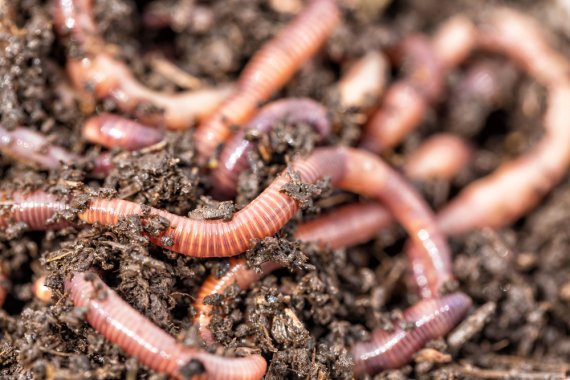Earthworms increase the fertility of the soil because they convert bound phosphate into available phosphate, shows PhD research by Mart Ros.
Ros graduated with a PhD on 29 March for his study of ways of making the phosphate in the soil more available to plants. That might seem odd, since the Dutch soil contains too much phosphate due to over-fertilization. ‘But a lot of that phosphate is not available to the plant because it is bound to soil particles and organic matter.’
Ryegrass
Also, environmental and agricultural legislation means less and less artificial fertilizer may be used. So there is a demand for ways of releasing the buffer of bound phosphate in the soil for use by plants. Ros did various experiments on the effect of earthworms on phosphate availability. Three different types of worm were placed in pots of English ryegrass growing in phosphate-poor soil: worms that live in the topsoil, those that live deeper underground, and those that go up and down between the two layers.
In the end, I found some soil on a small farm in Joppe
Mart Ros
It was not easy, actually, to get hold of phosphate-poor soil in the Netherlands. ‘In the end, I found some soil on a small farm in Joppe. It did contain some phosphate, but only in the bound form. The soil was red with iron, and that iron binds phosphate.’
All three groups of earthworms make more phosphate available through their faeces, according to Ros. But the worms that have the biggest effect are those that live in the topsoil and eat plant litter, and those that move up and down in the soil. Their faeces contain levels of freely available phosphate that are up to 1000 times higher than those of the surrounding soil. So the worms provide good manure, which can improve growth and increase biomass in phosphate-poor conditions.
Root growth
Ros also studied which grasses can best cope with a shortage of phosphate. He tested the growth rates and root development of eight varieties under phosphate-poor and phosphate-rich conditions. Fertilization seems to have no effect on root growth. But grasses with longer roots do considerably better than those with shorter roots.
According to Ros, this study shows that solutions are within reach when farmers are not allowed to use as much phosphate. ‘It is important to maintain the worm density in the soil. And if you are not allowed to apply as much phosphate, it helps to sow grasses with long roots.’

 Photo: Shutterstock
Photo: Shutterstock 


